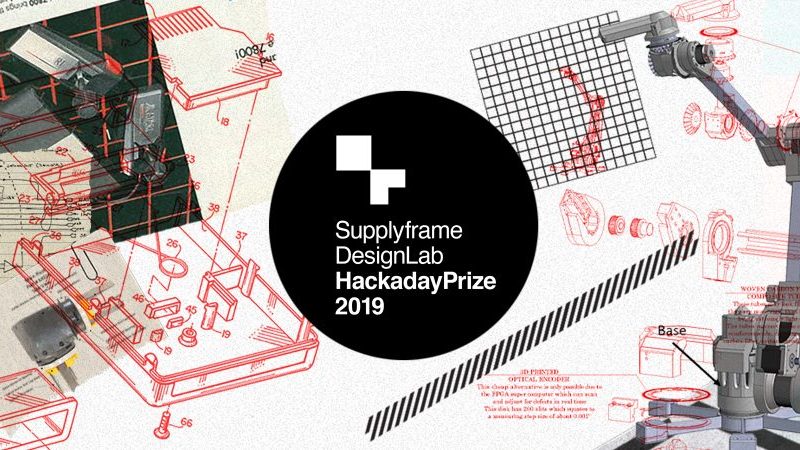Join us Wednesday, April 17 at noon Pacific time for the 2019 Hackaday Prize Hack Chat!
The 2019 Hackaday Prize was just announced, and this year the theme is designing for manufacturing. The hacker community has come a long, long way in the last few years in terms of the quality of projects we turn out. Things that were unthinkable just a few short years ago are now reduced to practice, and our benches and breadboards are always stuffed with the latest and greatest components and modules, all teaming up to do wondrous things. But what about the next step? Do you have what it takes to turn that mess o’ wires into a product? What skills do you need to add to your repertoire to make sure you can actually capitalize on your prototype — or more importantly, to get your ideas into someone else’s hands where they can actually do some good? That’s what the Hackaday Prize is all about this year, and we want you taking your projects to the next level!
Majenta Strongheart will be hosting the Hack Chat as we discuss:
- The importance of designing for manufacturing;
- What tools we have available to turn prototypes into projects;
- How the Hackaday Prize is set up this year, and why the theme was selected; and
- Why you should participate in the 2019 Hackaday Prize
You are, of course, encouraged to add your own questions to the discussion. You can do that by leaving a comment on the 2019 Hackaday Prize Hack Chat and we’ll put that in the queue for the Hack Chat discussion.
 Our Hack Chats are live community events on the Hackaday.io Hack Chat group messaging. This week we’ll be sitting down on Wednesday, April 17, at noon, Pacific time. If time zones have got you down, we have a handy time zone converter.
Our Hack Chats are live community events on the Hackaday.io Hack Chat group messaging. This week we’ll be sitting down on Wednesday, April 17, at noon, Pacific time. If time zones have got you down, we have a handy time zone converter.
Click that speech bubble to the right, and you’ll be taken directly to the Hack Chat group on Hackaday.io. You don’t have to wait until Wednesday; join whenever you want and you can see what the community is talking about.



















Yay, can’t wait to learn more about this year’s Prize!
I would love to hear from teams that truly have plans of creating a hardware company. Specifically how they plan on dealing with the contest’s open source requirements. Although the FAQ says “..we would like to see..”, the actual rules require full disclosure.
Since our product isn’t ultra-niche or educational and there’s no way for us to setup the company up as a service (Adiafruit), we decided to bow out this year. Would love to hear from others on how they plan to make it work though.
I’m not sure how I feel about this years prize. Unitl now till the Hackaday Prizes have always been structured to encourage open sourcing and helping improve the general state of the planet or hacking community – either by the areas (environment, special needs etc) or by the rules that plans and prototypes have to be published.
This year seems to turn that on its head and is actively encouraging closed-source product-focused designs which, from what I can see of the lists, are games or robot related to get the popularity vote for mass-production. While these are cool (and I’ve actually liked+followed a few) they all seem to be reluctant to open-source files so add little to the Hackaday community except to be something to watch.
A poor direction for a site like Hackaday.
I don’t think that’s true. Just because a product is manufacturable doesn’t mean it has to be closed-source. There are plenty of projects on Tindie and elsewhere that have all the design files available for download, while still having the product available for purchase. The seller does value-added work like kitting or even assembly and packaging, and it’s up to the buyer to decide if that’s a value proposition. Feel like doing all the work yourself? Fine, just grab the files. Value your time more or don’t have the expertise? Buy the finished product.
But none of that works if the project hasn’t been thought through and designed for manufacture. That’s the focus of the prize this year.
The rules for this DFM contest actually still require FULL open source disclosure.
Which I find interesting since OSH and DFM tend to be at odds with each other in regards to a company’s control and risk.
I’ve only seen the successful adoption of OSH business models with ultra-niche companies (no competition), companies dependent on the consumption of open-source hardware/software (3D printer companies) and service/distribution companies like Sparkfun (no innovation).
I can’t wait to see actual companies starting to enter this contest with innovative products, potentially entering a competitive market, with an OSH model. ..hopefully being the first to succeed somehow.